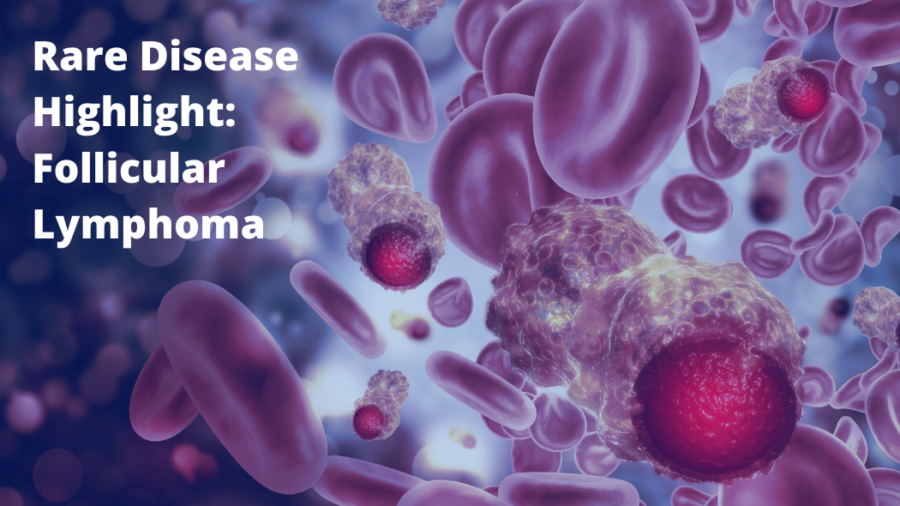Follicular lymphoma (FL) is a type of non-Hodgkin lymphoma (NHL), a white blood cell cancer. FL is characterized by the transformation of B-cells, a white blood cell type that is involved in antibody production, into malignant cancer cells. These malignant cells originate from B-cells of either centrocytic (small, cleaved) or centroblastic (larger, uncleaved) forms and grow in a pattern of follicles (Wu, 2013). FL is a rare disease that affects approximately 170,000 people in the US (Guadagnolo et al., 2006; SEER, 2021).
Although the underlying cause of FL is not understood, several genetic mutations associated with the disease have been identified. Translocations in chromosomes 14 and 18 have been detected in 85% of FL patients. A translocation appears when a portion of a chromosome breaks and then reattaches to a different chromosome. This translocation results in the overproduction of BCL-2, aprotein thatregulates cell death. BCL-2 overproductioninhibits normal cell death in the affected cells. However, this chromosome translocation has also been identified in normal, healthy B-cells, suggesting additional factors may play a role in the development of FL (Roulland et al., 2014).
Currently, the standard of care (SOC) for FL patients is focused on cytoreduction (the elimination of tumors) and palliative care to reduce symptoms (Stenner et al., 2018). Patients who are asymptomatic, those who do not develop symptoms, are not typically treated, but rather included in a program of “watchful waiting”. This program includes frequent check-ups to identify symptom presentation or disease progression (Bargetzi et al., 2018). SOC can vary depending on when treatment is initiated. In patients with early symptomatic disease, Stage I or II, and a lower tumor burden (limited presence of cancer), radiation and surgical removal may be sufficient to provide long lasting remission or even a cure (Bargetzi et al., 2018; Harada et al., 2016). If a patient develops symptoms later in the disease (stage III or IV), a combination regimen of a chemotherapy with rituximab, such as R-bendamustine (rituximab and bendamustine), R-CHOP (rituximab, cyclophosphamide, doxorubicin, vincristine, and prednisone), or R-CVP (rituximab, cyclophosphamide, vincristine, and prednisone), is implemented (LRF, 2021) Rituximab is an anti-CD20 antibody that is commonly used to treat several forms of B cell cancers, and is consistently part of SOC for symptomatic FL (Acrotech, 2020; Roche, 2010; Teva, 2008). CD20 is a protein commonly expressed on the surface of B-cells, making it an important therapeutic target. FL is characterized by frequent relapse, regardless of how well the patient initially responds to therapy, and resistance to rituximab develops over time (Aguiar-Bujanda et al., 2015). Along with the risk of resistance developing within the first 5 years of the disease, up to 13% of patients will progress into a more serious condition, and up to 28% of patients will progress within 10 years (Fischer et al., 2017; Freedman et al., 2020; Sugimoto et al., 2016). The lack of treatment durability, along with the risk of disease progression, highlight the unmet medical need in FL patients.
References
Acrotech. (2020). Marqibo. Retrieved from https://www.accessdata.fda.gov/drugsatfda_docs/label/2020/202497s010lbl.pdf
Aguiar-Bujanda, D., Blanco-Sánchez, M. J., Hernández-Sosa, M., Galván-Ruíz, S., & Hernández-Sarmiento, S. (2015). Critical appraisal of rituximab in the maintenance treatment of advanced follicular lymphoma. Cancer Manag Res, 7, 319-330. doi:10.2147/cmar.S69145
Bargetzi, M., Baumann, R., Cogliatti, S., Dietrich, P. Y., Duchosal, M., Goede, J., . . . Renner, C. (2018). Diagnosis and treatment of follicular lymphoma: an update. Swiss Med Wkly, 148, w14635. doi:10.4414/smw.2018.14635
Fischer, T., Zing, N. P. C., Chiattone, C. S., Federico, M., & Luminari, S. (2017). Transformed follicular lymphoma. Ann Hematol, 97(1), 17-29. doi:10.1007/s00277-017-3151-2
Freedman, A., & Jacobsen, E. (2020). Follicular lymphoma: 2020 update on diagnosis and management. Am J Hematol, 95(3), 316-327. doi:10.1002/ajh.25696
Guadagnolo, B. A., Li, S., Neuberg, D., Ng, A., Hua, L., Silver, B., . . . Mauch, P. (2006). Long-term outcome and mortality trends in early-stage, Grade 1-2 follicular lymphoma treated with radiation therapy. Int J Radiat Oncol Biol Phys, 64(3), 928-934. doi:10.1016/j.ijrobp.2005.08.010
Harada, A., Oguchi, M., Terui, Y., Takeuchi, K., Igarashi, M., Kozuka, T., . . . Hatake, K. (2016). Radiation therapy for localized duodenal low-grade follicular lymphoma. Journal of Radiation Research, 57(4), 412-417. doi:10.1093/jrr/rrw011
LRF. (2021). Follicular Lymphoma: Treatment Options. Retrieved from https://lymphoma.org/aboutlymphoma/nhl/fl/fltreatment/
Roche. (2010). Rituxan (rituximab) Label. Retrieved from https://www.accessdata.fda.gov/drugsatfda_docs/label/2010/103705s5311lbl.pdf
Roulland, S., Kelly, R. S., Morgado, E., Sungalee, S., Solal-Celigny, P., Colombat, P., . . . Nadel, B. (2014). t(14;18) Translocation: A predictive blood biomarker for follicular lymphoma. J Clin Oncol, 32(13), 1347-1355. doi:10.1200/jco.2013.52.8190
SEER. (2021). Cancer Stat Facts: NHL — Follicular Lymphoma. Retrieved from https://seer.cancer.gov/statfacts/html/follicular.html
Stenner, F., & Renner, C. (2018). Cancer Immunotherapy and the Immune Response in Follicular Lymphoma. Frontiers in Oncology, 8(219). doi:10.3389/fonc.2018.00219
Sugimoto, T., & Watanabe, T. (2016). Follicular Lymphoma: The Role of the Tumor Microenvironment in Prognosis. J Clin Exp Hematop, 56(1), 1-19. doi:10.3960/jslrt.56.1
Teva. (2008). BENDEKA. Retrieved from https://www.bendekahcp.com/globalassets/bendeka-hcp/prescribinginformation.pdf
Wu, D. (2013). Follicular Lymphoma. In S. Maloy & K. Hughes (Eds.), Brenner’s Encyclopedia of Genetics (Second Edition) (pp. 86-92). San Diego: Academic Press.
BioPharma Global is a mission-driven corporation dedicated to using our FDA and EMA regulatory expertise and knowledge of various therapeutic areas to help drug developers advance treatments for the disease communities with a unmet medical needs. If you are a drug developer seeking regulatory support for Orphan Drug designation, Fast Track designation, Breakthrough Therapy designation, other FDA/EMA expedited programs, type A, B (pre-IND, EOPs), or C meeting assistance, or IND filings, the BioPharma Global team can help. Contact us today to arrange a 30-minute introductory call.

